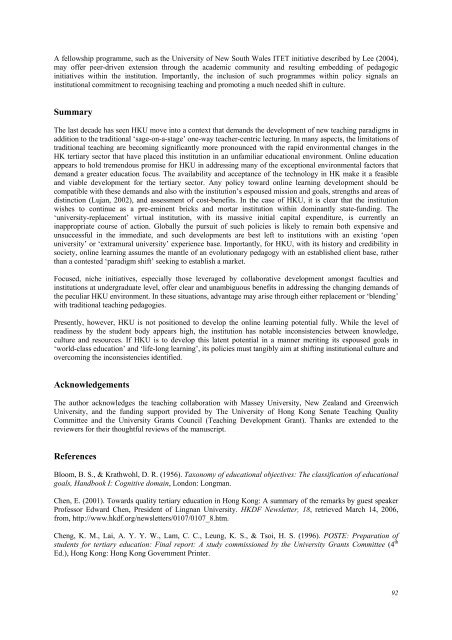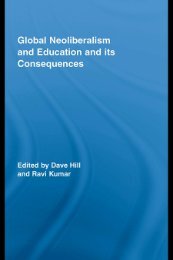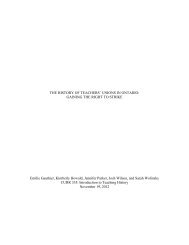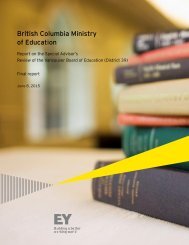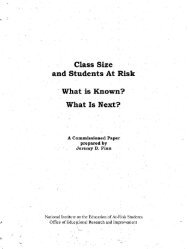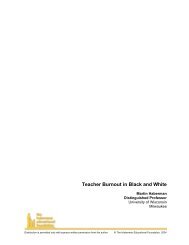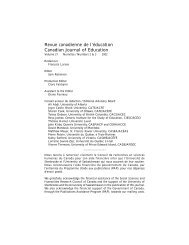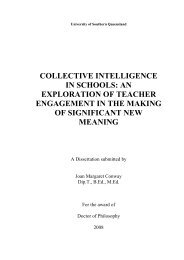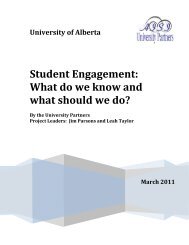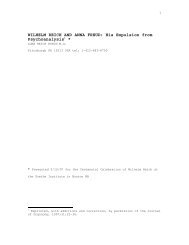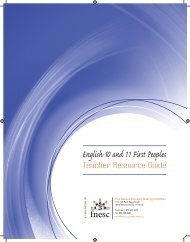October 2006 Volume 9 Number 4
October 2006 Volume 9 Number 4
October 2006 Volume 9 Number 4
Create successful ePaper yourself
Turn your PDF publications into a flip-book with our unique Google optimized e-Paper software.
A fellowship programme, such as the University of New South Wales ITET initiative described by Lee (2004),<br />
may offer peer-driven extension through the academic community and resulting embedding of pedagogic<br />
initiatives within the institution. Importantly, the inclusion of such programmes within policy signals an<br />
institutional commitment to recognising teaching and promoting a much needed shift in culture.<br />
Summary<br />
The last decade has seen HKU move into a context that demands the development of new teaching paradigms in<br />
addition to the traditional ‘sage-on-a-stage’ one-way teacher-centric lecturing. In many aspects, the limitations of<br />
traditional teaching are becoming significantly more pronounced with the rapid environmental changes in the<br />
HK tertiary sector that have placed this institution in an unfamiliar educational environment. Online education<br />
appears to hold tremendous promise for HKU in addressing many of the exceptional environmental factors that<br />
demand a greater education focus. The availability and acceptance of the technology in HK make it a feasible<br />
and viable development for the tertiary sector. Any policy toward online learning development should be<br />
compatible with these demands and also with the institution’s espoused mission and goals, strengths and areas of<br />
distinction (Lujan, 2002), and assessment of cost-benefits. In the case of HKU, it is clear that the institution<br />
wishes to continue as a pre-eminent bricks and mortar institution within dominantly state-funding. The<br />
‘university-replacement’ virtual institution, with its massive initial capital expenditure, is currently an<br />
inappropriate course of action. Globally the pursuit of such policies is likely to remain both expensive and<br />
unsuccessful in the immediate, and such developments are best left to institutions with an existing ‘open<br />
university’ or ‘extramural university’ experience base. Importantly, for HKU, with its history and credibility in<br />
society, online learning assumes the mantle of an evolutionary pedagogy with an established client base, rather<br />
than a contested ‘paradigm shift’ seeking to establish a market.<br />
Focused, niche initiatives, especially those leveraged by collaborative development amongst faculties and<br />
institutions at undergraduate level, offer clear and unambiguous benefits in addressing the changing demands of<br />
the peculiar HKU environment. In these situations, advantage may arise through either replacement or ‘blending’<br />
with traditional teaching pedagogies.<br />
Presently, however, HKU is not positioned to develop the online learning potential fully. While the level of<br />
readiness by the student body appears high, the institution has notable inconsistencies between knowledge,<br />
culture and resources. If HKU is to develop this latent potential in a manner meriting its espoused goals in<br />
‘world-class education’ and ‘life-long learning’, its policies must tangibly aim at shifting institutional culture and<br />
overcoming the inconsistencies identified.<br />
Acknowledgements<br />
The author acknowledges the teaching collaboration with Massey University, New Zealand and Greenwich<br />
University, and the funding support provided by The University of Hong Kong Senate Teaching Quality<br />
Committee and the University Grants Council (Teaching Development Grant). Thanks are extended to the<br />
reviewers for their thoughtful reviews of the manuscript.<br />
References<br />
Bloom, B. S., & Krathwohl, D. R. (1956). Taxonomy of educational objectives: The classification of educational<br />
goals, Handbook I: Cognitive domain, London: Longman.<br />
Chen, E. (2001). Towards quality tertiary education in Hong Kong: A summary of the remarks by guest speaker<br />
Professor Edward Chen, President of Lingnan University. HKDF Newsletter, 18, retrieved March 14, <strong>2006</strong>,<br />
from, http://www.hkdf.org/newsletters/0107/0107_8.htm.<br />
Cheng, K. M., Lai, A. Y. Y. W., Lam, C. C., Leung, K. S., & Tsoi, H. S. (1996). POSTE: Preparation of<br />
students for tertiary education: Final report: A study commissioned by the University Grants Committee (4 th<br />
Ed.), Hong Kong: Hong Kong Government Printer.<br />
92


